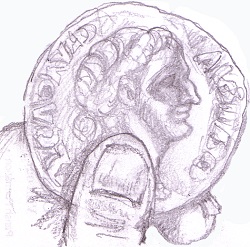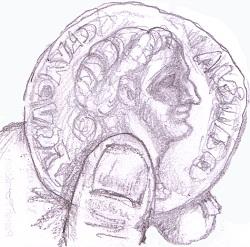

“I am the LORD, there is no other” (Isaiah 45:6).
Twenty-Ninth Sunday of the Year
Isa 45:1, 4-6; Ps 96; 1 Thess 1:1-5b; Matt 22:15-21
Jesus not only eludes the attempt by his enemies to trap him over Roman taxes; he turns the trap on them by showing their compliance in carrying the Roman coin with a graven image of the emperor as a god. Jesus’ answer encompasses the rights of both realms, church and state, while insisting there is only one reality, that of the one God, Lord of the world.
Jesus’ words, “Give to Caesar what is Caesar’s and to God what is God’s,” like another saying, “Let him who is without stone cast the first stone,” have survived time as brilliant starters for any discussion about balancing mercy and justice or civic duty with religious obedience. In our upcoming elections, these dilemmas underly questions about how far bishops can go in instructing Catholic voters and how those same voters reconcile their consciences with Catholic teaching.
Jesus was not familiar with our Bill of Rights, but he did know Isaiah’s commitment to the sovereignty of God. He and Isaiah lived immersed in the assumption of divine authority over the Universe and history, where God meets human freedom with serious consequences. Obeying God’s plan woven into Creation and human consciousness brings peace, justice and harmony. Rejecting it ensures conflict, injustice and chaos.
The American framers hoped to bring peace, justice and harmony by keeping church and state separate to protect the freedom of all citizens of any or no faith in a secular and pluralistic society. Religion should not interfere with or usurp government authority and government should not favor one religion over others. The framers could not have anticipated the complexity of this separation going forward, but they did not expect religious ideas and values to be absent from political life. It was always to be a dialogue and a balancing act.
Having this Gospel read, preached and widely discussed just weeks before the general election is both a blessing and a provocation. Politicians want the “Catholic” vote and discrete or silent endorsements. The church has important principles to contribute to public debate. Catholic voters want to be faithful citizens free to discern how to vote the best possible outcome for the common good of the country. This election poses extraordinary challenges for all our institutions and protocols, even voting itself because of stress over public health, the economy and social divisions.
Jesus did not avoid tension and knew the political agenda behind trapping him to deliver him to death for subverting both church and state power. The Sanhedrin will condemn him for blasphemy and Rome will crucify him for challenging the divine Caesar. Jesus unites his faith in God and his love for God’s people in the vision of a Beloved Community where justice and mercy provide “life, liberty and the pursuit of happiness” for all.
It is up to us to balance these same goals and values as he did, even if it is a risky and difficult path.
Advertisement








